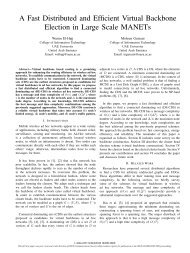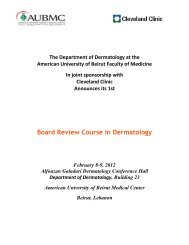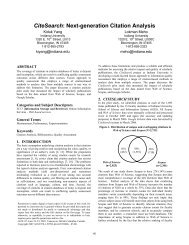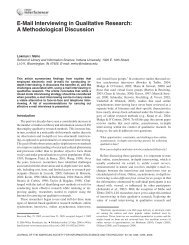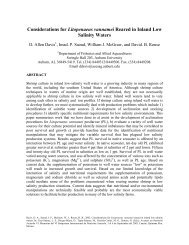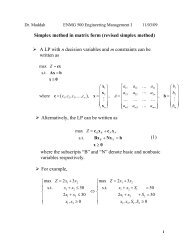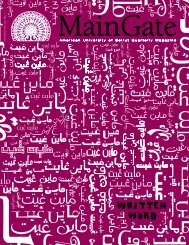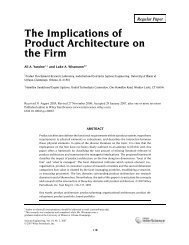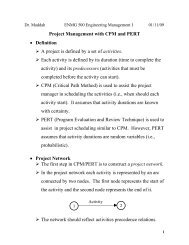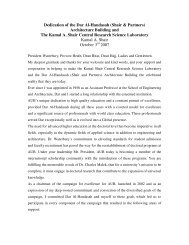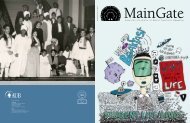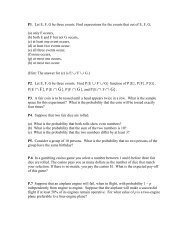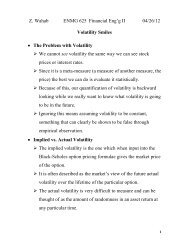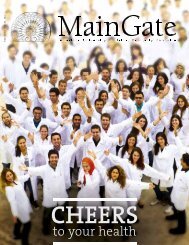Nahr el Bared Refugee Camp Crisis (Lebanon) - American ...
Nahr el Bared Refugee Camp Crisis (Lebanon) - American ...
Nahr el Bared Refugee Camp Crisis (Lebanon) - American ...
Create successful ePaper yourself
Turn your PDF publications into a flip-book with our unique Google optimized e-Paper software.
Access to Education and HealthAkkar records the highest illiteracy percentage in <strong>Lebanon</strong> (for females, 30.5% comparedto13.6% in <strong>Lebanon</strong> and for males 23.1% compared to 9.3% in <strong>Lebanon</strong> (Nehmeh, 2007). Therate of enrolment in public schools in Akkar is the highest in <strong>Lebanon</strong>. Akkar records low lev<strong>el</strong>sin education enrolments within different stages, particularly high school and university education–the lowest in <strong>Lebanon</strong>. Moreover, Akkar holds a high percentage of d<strong>el</strong>ayed education – thehighest rates have been recorded there. According to Samer Fatfat (2008) drop-outs syndrome isdriven by the overwh<strong>el</strong>ming economic situation, whereby parents oblige their children to enterthe informal job market early in life to assist the family in making its living.Another problem in this region that the majority of the teachers are lacking teaching skills andare contractual and not permanent staff. Support training teachers to use curriculum and newtechniques in education is very important.Akkar and our localities have several education institutions. There are many public schoolsproviding education from kindergarten to the secondary lev<strong>el</strong>. However, the physical conditionsof these schools however, are dilapidated, especially in Behnine and Muhammara. In additionthere are many private schools. Other educational institutions include the Dar Moualamin, ateacher’s school, and technical schools that provide with BT and TS degrees in finance,computer science, mechanic, <strong>el</strong>ectronics, architectural drawings, administrative computing andoffer training for kindergarten teachers.Due to the poor employment opportunities in Akkar and especially in the concerned localities,the population with higher education lev<strong>el</strong>s is more lik<strong>el</strong>y not to return to their place of origin.Consequently, there is a lack of w<strong>el</strong>l trained and skilled labour in Akkar.The health infrastructure in the concerned localities is insufficient to accommodate all thedemand of ill people and lack of many specializations. Specificity of Akkar that the sweepingmajority of the active population are in the informal sector that provides no indemnity, socialsecurity or health insurance. This infrastructure includes public modest hospital in Halba and twoprivate. In addition, there are medical centers that offer health services and medical check-ups.Some of these centers, such as the Health Department or the Centre for dev<strong>el</strong>opmental servicesof the Ministry of Social Affairs, the Red Cross Centre, Al-Hariri center in Bebnine and othercenters run by NGOs, offer services at very low rates, and are affordable to the mostdisadvantaged populations in Akkar. Many of these health centers don’t offer a variety of serviceand don’t have specialized doctors. The bad transportation system, especially for the remorevillage, discourages people to consult medical centers. There are also many pharmacies andmedical laboratories. Before the destruction of <strong>Nahr</strong> al-<strong>Bared</strong>, the new camp had offered manymedical services with affordable price to the whole area of Akkar and Badawi.Sewage and Potable WaterThe most problematic infrastructural issue in the concerned localities, and especially Halba, isthe sewage network and the provision of potable water. However, sewage and portable water are



